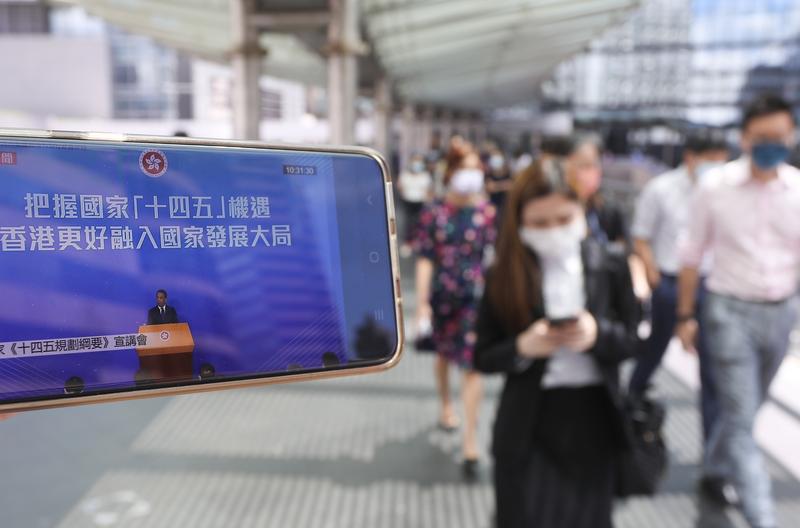 This photo taken in Central shows a live stream of the speech of Huang Liuquan, deputy head of the Hong Kong and Macao Affairs Office of the State Council, during the talk on the National 14th Five-Year Plan organized by the Hong Kong Special Administrative Region government on Aug 23, 2021. (CALVIN NG / CHINA DAILY)
This photo taken in Central shows a live stream of the speech of Huang Liuquan, deputy head of the Hong Kong and Macao Affairs Office of the State Council, during the talk on the National 14th Five-Year Plan organized by the Hong Kong Special Administrative Region government on Aug 23, 2021. (CALVIN NG / CHINA DAILY)
Members of a high-level delegation from the central government on Monday said more measures to support Hong Kong's further integration with the national development will be rolled out, including mutual recognition of professional credentials in different trades and further support to enhance ties on finance and trade.
Hu Zhaohui, deputy director of the department of development planning of the National Development and Reform Commission, said that the nation will further strengthen Hong Kong's roles as a global offshore renminbi business hub and an international asset management and risk management center, adding that the nation will expand the interconnections between mainland and Hong Kong financial markets.
To facilitate closer integration, Hu Zhaohui, deputy director of the department of development planning of the National Development and Reform Commission, revealed that the central government will expand the scope of mutual recognition of professional credentials in the future, including that those of social workers and of tourism professionals
Hu made the remarks at a talk in Hong Kong held by the delegation on the nation's 14th Five-Year Plan (2021-25) for social and economic development. Leading officials from the Hong Kong SAR government attended the talk on Monday morning.
Under the 14th Five-Year Plan, the nation will enhance its capacity to use foreign capital, Hu said. He welcomed more overseas companies, including Hong Kong companies, to participate in the national development and support mainland enterprises' overseas endeavors to achieve mutual development.
Noting that Hong Kong has a solid research basis to develop into an international innovation and technology hub, Hu said that the central government will speed up the construction of the Shenzhen-Hong Kong Science and Technology Park, and carry out more measures to facilitate the exchange of talent, and settlement of scientific research funds and facilities in the development of the Guangdong-Hong Kong-Macao Greater Bay Area.
In the meantime, to facilitate closer integration, Hu revealed that the central government will expand the scope of mutual recognition of professional credentials in the future, including that those of social workers and of tourism professionals.
ALSO READ: Officials: National plan to bring vitality, opportunities for HK
Also sharing at the talk, Zhou Chengjun, director of the People's Bank of China's Finance Research Institute, said Hong Kong is well-positioned to be the asset management center and risk management center for renminbi assets.
He likened renminbi as the blood cells and bloodline linking the city with the nation.
Zhou called on the SAR government to formulate a mechanism to carry out the financial roles that the national five-year plan has bestowed on the city.
Huang Shengbiao, deputy director-general of the department of research commercialization and regional innovation under the Ministry of Science and Technology, believed that the ministry will strengthen cooperation with the HKSAR to enhance Hong Kong's appeal to capital, talent and tech projects.
The ministry will also support China's national high-tech zones to establish research organizations in Hong Kong to facilitate industrial integration.
He hopes that Hong Kong can speed up its transformation, along with the construction of the Greater Bay Area, into an international center for innovation and technology.
READ MORE: Survey: GBA business sentiment rises for fifth straight quarter
Li Xiao, deputy director-general of the China Science and Technology Exchange Center under the ministry, said Hong Kong should first have the competitive capacity in innovation and then the nation will open up more projects for Hong Kong scientists.
With that, policies to facilitate the two places in science and research collaboration will follow, Li said.


